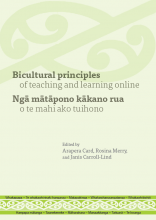Bicultural Principles of Best Practice for Teaching and Learning Online : Nga matapono kakano rua o te mahi
- Unit price
- / per
-
Author:CARD Arapera / MERRY Rosina / CARROLL-LIND
-
ISBN:9781990040542
-
Publication Date:August 2022
-
Edition:1
-
Pages:
-
Binding:Paperback
-
Publisher:New Zealand Council for Educational Research
-
Country of Publication:New Zealand


A Back Order button means that we don’t have the book in stock at our store. It may already be on order – or we can order it for you from a publisher or distributor at no additional cost.
As we source items from around the globe, a back-order can take anywhere from 5 days to several weeks to arrive, depending on the title.
To check how long this might take, you’re welcome to contact us and we can provide an ETA or any other information you need. We recommend checking the timeframe before committing to an online order.
Bicultural Principles of Best Practice for Teaching and Learning Online : Nga matapono kakano rua o te mahi
- Unit price
- / per
-
Author:CARD Arapera / MERRY Rosina / CARROLL-LIND
-
ISBN:9781990040542
-
Publication Date:August 2022
-
Edition:1
-
Pages:
-
Binding:Paperback
-
Publisher:New Zealand Council for Educational Research
-
Country of Publication:New Zealand
Description
This resource sets out 11 principles that are inherent in best practice for teaching in an online bicultural delivery environment. The intention of these principles is to provide all kaiako with a shared understanding of online teaching expectations that embrace tikanga principles and practices throughout all areas of their online teaching . The bicultural principles were initially developed for a tertiary organisation, Te Rito Maioha Early Childhood New Zealand, but are readily transferrable to all educational settings.
Each chapter in this book begins with a principle that is then expanded on in more depth by individual authors. Some of the principles were developed with a theoretical approach, while others have a more applied approach. When reflecting on best bicultural practices for teaching online, it should be acknowledged that these 11 principles come as a package. They are an interacting mix, and the importance of their inter-relationships must be noted. No principle should be considered in isolation.
Adding product to your cart
You may also like
A Back Order button means that we don’t have the book in stock at our store. It may already be on order – or we can order it for you from a publisher or distributor at no additional cost.
As we source items from around the globe, a back-order can take anywhere from 5 days to several weeks to arrive, depending on the title.
To check how long this might take, you’re welcome to contact us and we can provide an ETA or any other information you need. We recommend checking the timeframe before committing to an online order.
You may also like
You may also like
-
This resource sets out 11 principles that are inherent in best practice for teaching in an online bicultural delivery environment. The intention of these principles is to provide all kaiako with a shared understanding of online teaching expectations that embrace tikanga principles and practices throughout all areas of their online teaching . The bicultural principles were initially developed for a tertiary organisation, Te Rito Maioha Early Childhood New Zealand, but are readily transferrable to all educational settings.
Each chapter in this book begins with a principle that is then expanded on in more depth by individual authors. Some of the principles were developed with a theoretical approach, while others have a more applied approach. When reflecting on best bicultural practices for teaching online, it should be acknowledged that these 11 principles come as a package. They are an interacting mix, and the importance of their inter-relationships must be noted. No principle should be considered in isolation.
-
-
Author: CARD Arapera / MERRY Rosina / CARROLL-LINDISBN: 9781990040542Publication Date: August 2022Edition: 1Pages:Binding: PaperbackPublisher: New Zealand Council for Educational ResearchCountry of Publication: New Zealand
This resource sets out 11 principles that are inherent in best practice for teaching in an online bicultural delivery environment. The intention of these principles is to provide all kaiako with a shared understanding of online teaching expectations that embrace tikanga principles and practices throughout all areas of their online teaching . The bicultural principles were initially developed for a tertiary organisation, Te Rito Maioha Early Childhood New Zealand, but are readily transferrable to all educational settings.
Each chapter in this book begins with a principle that is then expanded on in more depth by individual authors. Some of the principles were developed with a theoretical approach, while others have a more applied approach. When reflecting on best bicultural practices for teaching online, it should be acknowledged that these 11 principles come as a package. They are an interacting mix, and the importance of their inter-relationships must be noted. No principle should be considered in isolation.
-
Author: CARD Arapera / MERRY Rosina / CARROLL-LINDISBN: 9781990040542Publication Date: August 2022Edition: 1Pages:Binding: PaperbackPublisher: New Zealand Council for Educational ResearchCountry of Publication: New Zealand
-



